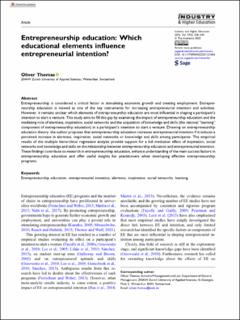Please use this identifier to cite or link to this item:
https://doi.org/10.21256/zhaw-25994| Publication type: | Article in scientific journal |
| Type of review: | Peer review (publication) |
| Title: | Entrepreneurship education : which educational elements influence entrepreneurial intention? |
| Authors: | Thomas, Oliver |
| et. al: | No |
| DOI: | 10.1177/09504222221121065 10.21256/zhaw-25994 |
| Published in: | Industry and Higher Education |
| Volume(Issue): | 37 |
| Issue: | 3 |
| Page(s): | 328 |
| Pages to: | 344 |
| Issue Date: | 12-Aug-2022 |
| Publisher / Ed. Institution: | Sage |
| ISSN: | 0950-4222 2043-6858 |
| Language: | English |
| Subjects: | Alertness; Entrepreneurial intention; Entrepreneurship education; Inspiration; Social network; Learning |
| Subject (DDC): | 378: Higher education 658: General Management |
| Abstract: | Entrepreneurship is considered a critical factor in stimulating economic growth and creating employment. Entrepreneurship education is viewed as one of the key instruments for increasing entrepreneurial intention and activities. However, it remains unclear which elements of entrepreneurship education are most influential in shaping a participant’s intention to start a venture. This study aims to fill this gap by examining the impact of entrepreneurship education and the mediating role of alertness, inspiration, social networks and the acquisition of knowledge and skills (the rational “learning” component of entrepreneurship education) in a participant’s intention to start a venture. Drawing on entrepreneurship education theory, the author proposes that entrepreneurship education increases entrepreneurial intention if it induces a perceived increase in alertness, inspiration, social networks or knowledge and skills among participants. The empirical results of the multiple hierarchical regression analysis provide support for a full mediation effect of inspiration, social networks and knowledge and skills on the relationship between entrepreneurship education and entrepreneurial intention. These findings contribute to research in entrepreneurship education, enhance understanding of the main success factors in entrepreneurship education and offer useful insights for practitioners when developing effective entrepreneurship programs. |
| URI: | https://digitalcollection.zhaw.ch/handle/11475/25994 |
| Fulltext version: | Published version |
| License (according to publishing contract): | CC BY 4.0: Attribution 4.0 International |
| Departement: | School of Management and Law |
| Appears in collections: | Publikationen School of Management and Law |
Files in This Item:
| File | Description | Size | Format | |
|---|---|---|---|---|
| 2022_Thomas_Entrepreneurship-education.pdf | 699.97 kB | Adobe PDF |  View/Open |
Show full item record
Thomas, O. (2022). Entrepreneurship education : which educational elements influence entrepreneurial intention? Industry and Higher Education, 37(3), 328–344. https://doi.org/10.1177/09504222221121065
Thomas, O. (2022) ‘Entrepreneurship education : which educational elements influence entrepreneurial intention?’, Industry and Higher Education, 37(3), pp. 328–344. Available at: https://doi.org/10.1177/09504222221121065.
O. Thomas, “Entrepreneurship education : which educational elements influence entrepreneurial intention?,” Industry and Higher Education, vol. 37, no. 3, pp. 328–344, Aug. 2022, doi: 10.1177/09504222221121065.
THOMAS, Oliver, 2022. Entrepreneurship education : which educational elements influence entrepreneurial intention? Industry and Higher Education. 12 August 2022. Bd. 37, Nr. 3, S. 328–344. DOI 10.1177/09504222221121065
Thomas, Oliver. 2022. “Entrepreneurship Education : Which Educational Elements Influence Entrepreneurial Intention?” Industry and Higher Education 37 (3): 328–44. https://doi.org/10.1177/09504222221121065.
Thomas, Oliver. “Entrepreneurship Education : Which Educational Elements Influence Entrepreneurial Intention?” Industry and Higher Education, vol. 37, no. 3, Aug. 2022, pp. 328–44, https://doi.org/10.1177/09504222221121065.
Items in DSpace are protected by copyright, with all rights reserved, unless otherwise indicated.